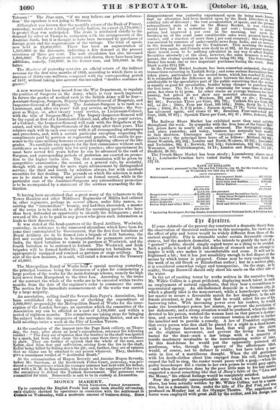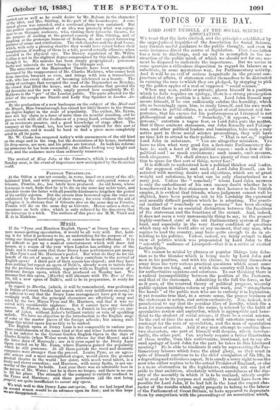641 , Synitrts.
If some Aristotle of the present day constructed a dramatic theory from the observation of theatrical audiences in this metropolis, his views as to the effect of pity and terror would be widely different from those of the ancient stagyrite. Pity is attainable under certain favourable circum- stances, but the modern dramatist, who intends to gratify the taste of a "genteel" public, should simply regard terror as a thing to be avoided. Such a public is hard of faith and delicate of stomach and an attempt to inspire it with awe makes it uncomfortable and cross. It will not be frightened a bit ; but it has just sensibility enough to feel disgust at the means by which terror is prepared. Crime may be very respectable in the work of an old Greek or Elizabethan author ; but in a modem play, it is considered somewhat vulgar and transpontine. On the stage, as in reality, George Barnwell should only shoot his uncle on the other side of the water.
In the art of exciting terror by works written in the narrative form, Mr. Wilkie Collins is a great proficient, displaying much talent in Fru& an employment of natural expedients, that they bear a resemblance supernatural agency. An old-fashioned domicile in a German city, n which a ghastly idiot is the man-servant, while a housekeeper who robs her master to secure a favourable match for her daughter, is the soie female attendant, is just the spot that he would select for one of his harrowing tales. With increasing power over his readers, he wrold make the housekeeper poison her master, to prevent the revelatioi3. of her dishonesty, and a strong situation would be produced, when the idiot, devoted to his patron, watched the woman bent on that patron's destruc- tion, and screwed his wits to the extremest tension in order to further the mischief and to provide a remedy. A law of Frankfort enjoining that every person who dies shall be placed for a night in a dead-house, with a bell-rope fastened to his hand, that will give the alatm on the slightest movement, and prevent the living from being buried for the dead—such a law brings with it a quantity of terrific machinery invaluable to the terror-inspiring writer of tales. In this dead-house he would put the apparently poisoned. old gentleman, who, through the agency of the affectionate idiot, would, of course, not be defunct in reality, but have taken a nar- cotic in lieu of a mortiferous draught. When the old gentleman with his death-clothes about hint emerged front his cell, having first caused the bell to ring, the reader would pause with a gtuip,—when t.he guilty housekeeper fell a victim to her own poison he would gasp egami —and when the services done by the poor little man to his late.inseq suggested a moral something like that of 2Esop's fable of the "Lion anti the Mouse," his ethical feelings would be completely satisfied. . Now the perfectly unexceptionable story which we have indicated above, has been actually written by Mr. Wilkie Collins, not in a narra- tive, but in a dramatic form, under the title of 17w Red Trials and vaB, produced On Monday last at the Olympic Theatre. The oxped!enta terror were employed with great skill by the author, and his design Was 'ed out as well as he could desire by Mr. Robson in the character of the idiot, and Mrs. Stirling, in the part of the housekeeper. A con- tinual gloom was intended, and a continual gloom was sustained. But this perfeot ace.omplishment of an idea was precisely what was repug- nant to an Olympic audience, who, visiting their favourite theatre, for the purpose of smiling at the genteel comedy of Mrs. Stirling, and of inughing at the grotesque humour of Robson, do not expect harrowing pictures of crime and retribution. The rich chamber and the dead house, which, with only a pleasing shudder they would have raised before their imaginations, if reading of them in a tale, proved actually offensive when revealed to the physical eye. The literary reputation of Mr. Wilkie Collins is not in the slightest degree compromised by this failure, decided though it be. His mistake has been simply geographical ; poisonous herbs and minerals do not belong to the Olympic soil.
The attractions of the Haymarket Theatre have been unexpectedly increased by the reappearance of Mr. Charles Mathews, who comes back from America, buoyant as ever, and brings 'with him a transatlantic wife, who has every chance of becoming celebrated as a beauty. The string of carriages that occupied the road of the Haymarket on Monday, the crowd that filled the house, and the acclamations that greeted the old favourite and the new wife amply proved how completely Mr. C. Mathews is the "pet" of the Linden public. The parts selected for the (laid of the couple are Dazzle and Lady Gay Spanker in _London As- surance. •
By the production of a new burlesque on the subject of the Maid and the Magpie' Miss Swanberough has raised her little theatre in the Strand one degree higher in the scale of popularity. The author, Mr. Byron, does not lay claim to a fame of more than six months' standing, and he goes to work with all the freshness of a young hand, evincing the talent of an inveterate punster, and a good knowledge of stage effect. The company at the Strand, too, has been specially trained for this sort of entertainment, and it would be hard to find a piece more completely acted in all its parts.
Mr. W. Cooke has reopened Astley's with amusements of the old kind on the stage and in the ring, but the decorations of his house, including his drop-scene, are new, and his prices are lowered. In both his reform- ing processes he has been successful ; the edifice looking very bright and clear, and the audience more than ordinarily numerous.
The revival of King John at the Princess's, which is announced for Monday next, is the event of importance now anticipated by the theatrical world.
PARISIAN THEATRICALS.
At the Odeon a one act comedy, in verse, based on a story of the old- fashioned kind, and with personages bearing the antiquated names of Gerente, Frontin, &c., has lately been produced. An old hunx, whose horoscope is cast, finds that he is to die on the same day as his valet, and therefore treats the latter with all possible kindness to lengthen the period a his earthly sojourn. But the sweets thus bestowed upon the valet are embittered by the knowledge of their cause ; for even without the aid of syllogMm it is obvious that if Gerente dies on the same day as Frontin, Frontin will die on the same day as Geronte. Hence arises a state of uneasiness on both sides, which is only relieved by the discovery that the horoscope is a trick. The authors of this piece are M.M. Iriard and H. de la Madelene.



























 Previous page
Previous page